2021-2022 Scholars
Meet this year’s exceptional scholars who are driving implementation of effective strategies to raise awareness of diagnosis in medicine, support diagnostic excellence, and reduce diagnostic errors at the national level. If you would like to connect with any of them, please contact us.
Cornelius James, MD
University of Michigan Medical School
Jessica Keim-Malpass, PhD, RN
University of Virginia
Mei-Sing Ong, PhD
Harvard Medical School/Harvard Pilgrim Health Care Institute
Jorge Rodriguez, MD
Harvard Medical School/Brigham and Women’s Hospital
Lekshmi Santhosh, MD, MAEd
University of California, San Francisco
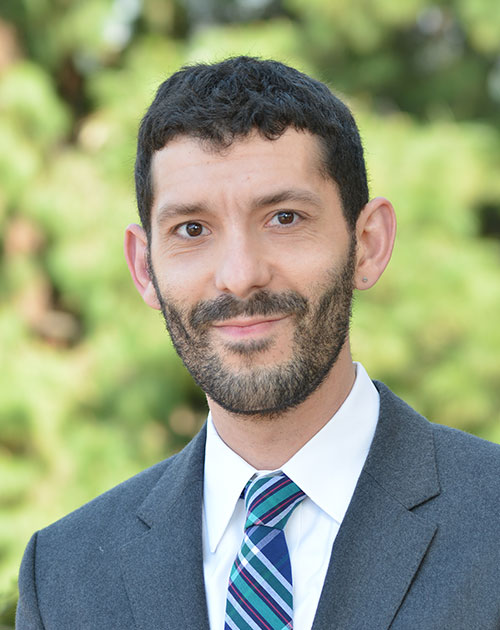
Jonathan Baghdadi, MD, PhD
University of Maryland School of Medicine
Dr. Baghdadi is an assistant professor in the Department of Epidemiology and Public Health at the University of Maryland School of Medicine. He also serves as an infectious disease physician and hospital epidemiologist at the University of Maryland Medical Center (UMMC). Dr. Baghdadi chairs the Infection Prevention Committee and co-chairs the Sepsis Working Group at UMMC Midtown Campus, a 170-bed acute care facility in Downtown Baltimore.
Dr. Baghdadi’s research interests involve quality measurement in early sepsis care and diagnostic stewardship of advanced molecular tests for infectious diseases. His long-term scientific goals are to redesign systems of care to reduce harm from misdiagnosis, overdiagnosis, and inappropriate treatment among patients with suspected infections.
Dr. Baghdadi received a B.A. from Columbia University, an M.D. from New York University, and a Ph.D. in health policy and management from the UCLA Fielding School of Public Health. He completed his residency at the Washington University in St. Louis, a fellowship in infectious diseases at UCLA, and an advanced fellowship in quality improvement at the VA Greater Los Angeles Health Care System. He is board certified in internal medicine and infectious diseases.
Proposal: Diagnostic Stewardship of Multiplex Molecular Panel Tests to Improve Antibiotic Use

Komal Bajaj, MD, MSHPEd
NYC Health + Hospitals/Jacobi
Dr. Bajaj is the chief quality officer of NYC Health + Hospitals/Jacobi, a 457-bed Level I trauma center. She also serves as the clinical director for NYC Health + Hospitals Simulation Center, which delivers more than 10,000 interprofessional participant encounters annually, and is a professor of obstetrics & gynecology at Albert Einstein College of Medicine. Dr. Bajaj sits on the Board of Trustees of Harvard’s Center for Medical Simulation, the Advisory Board for the Foundation for Healthcare Simulation Safety, and the External Advisory Board for the Joan H. Marks Graduate Program in Human Genetics of Sarah Lawrence College.
Dr. Bajaj is an internationally recognized speaker on the use of simulation to advance healthcare quality and safety. Her scholarly interests include defining innovative approaches to embed simulation within the clinical environment, ingraining equity into quality & safety structures, and characterizing the emerging role of debriefing in healthcare quality/safety.
Dr. Bajaj received a B.S. from Benedictine University, an M.D. from The Feinberg School of Medicine of Northwestern University, and an M.S. in Health Professions Education from the Massachusetts General Hospital Institute of Health Professions. She completed her residency in obstetrics & gynecology at the McGaw Medical Center of Northwestern University and a fellowship in reproductive genetics at the Albert Einstein College of Medicine. She is board certified in obstetrics & gynecology and medical genetics. She is also a certified healthcare simulation educator.
Proposal: “Not a Moment to Lose!”: Using Simulation to Identify and Mitigate Diagnostic Errors that Contribute to Delays during Maternal Hemorrhage Care
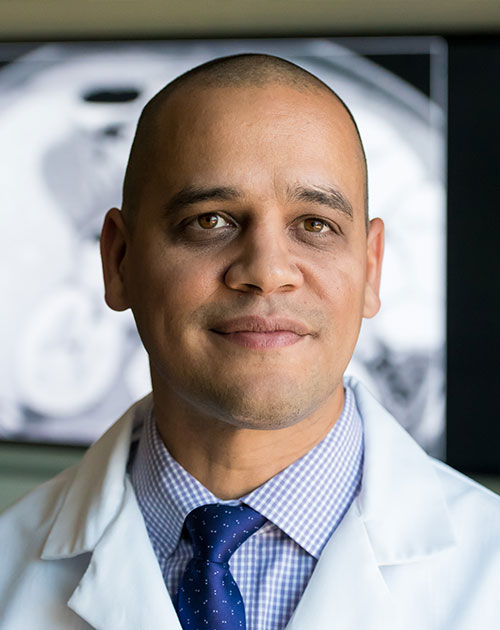
Efrén Flores, MD
Massachusetts General Hospital/Harvard Medical School
Dr. Flores is a radiologist at the Massachusetts General Hospital (MGH) and an assistant professor of radiology at the Harvard Medical School. He is also an Associate Chair of Mass General Brigham (MGB) Enterprise Radiology Inclusion, Equity and Community Health. Dr. Flores is an active member of the various institutional and national committees that aim to improve health care access among vulnerable communities, including the MGH Executive Committee on Community Health, Health Equity, Prevention, and Imaging committees of the ECOG-ACRIN Cancer Research Group, and the Provider Engagement and Outreach Committee of the National Lung Cancer Roundtable, among others.
Dr. Flores’s research focuses on understanding health disparities to inform the development of novel transdisciplinary interventions at the intersection of equity, innovation, and healthcare to enhance health access among underserved patient populations. He has developed a nationally recognized health services research program focused on elucidating disparities in radiology care due to the social determinants of health and community-based, culturally sensitive interventions to advance health equity through innovative interventions that improve access to radiology care among underserved populations.
Dr. Flores received a B.S. from the University of Puerto Rico, Rio Piedras, and an M.D. from the University of Puerto Rico School of Medicine. He completed both a residency and a fellowship at the MGH. Dr. Flores is board certified in radiology.
Proposal: A Community-Based Participatory Approach to Understand Current and Emerging Barriers and Promoters to Lung Cancer Screening (LCS) One-Year post-COVID-19 Pandemic Start and Guide Culturally-Tailored LCS Outreach among Latino Communities
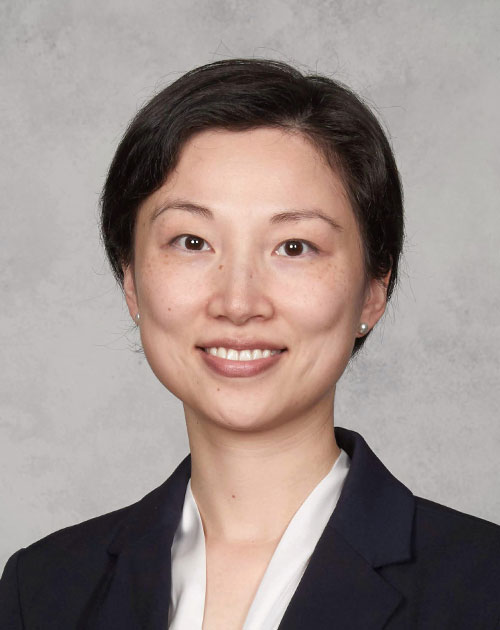
Linda Geng, MD, PhD
Stanford University
Dr. Geng is a clinical assistant professor in the Department of Medicine, Division of Primary Care and Population Health at Stanford University. She leads the Consultative Medicine clinic, a team-based diagnostic service at Stanford that focuses on improving the diagnosis of rare, puzzling, and complex conditions. Dr. Geng is also a co-director of the Stanford Post-Acute COVID-19 Syndrome Clinic.
Dr. Geng’s scholarly interests include improving diagnostic performance and developing systematic approaches to shorten diagnostic journeys and reduce harm. She is particularly interested in promoting patient engagement and improving diagnosis of underrecognized and rare conditions in minority patient populations.
Dr. Geng received a B.A. and a B.S. from Rice University and an M.D. and a Ph.D. in molecular and cellular biology from the University of Washington. She completed her residency at Stanford University followed by a Chief Resident year. She was a visiting scholar at the National Institutes of Health in their Undiagnosed Disease Program. Dr. Geng is board certified in internal medicine.
Proposal: Improving the Diagnosis of Under Recognized Diseases in Racial and Ethnic Minorities through Patient Engagement and Empowerment
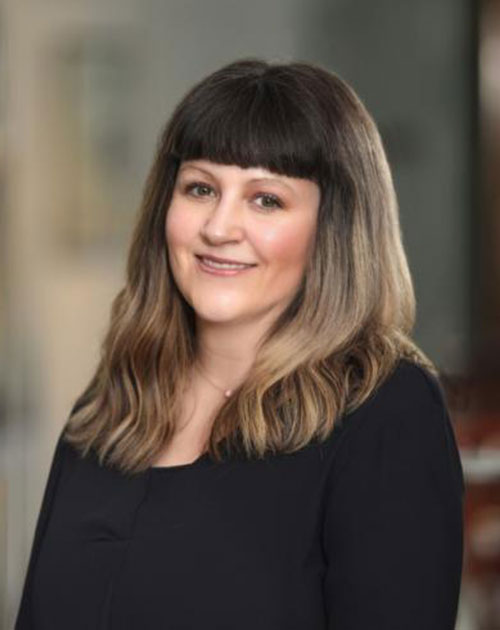 Traber Giardina, PhD
Traber Giardina, PhD
Baylor College of Medicine
Dr. Giardina is a patient safety researcher and an assistant professor in the Department of Medicine at Baylor College of Medicine. She also serves as an investigator at the Center for Innovations in Quality, Effectiveness and Safety at the Michael E. DeBakey VA Medical Center.
Dr. Giardina’s work focuses on patients’ experiences of diagnostic error and exploring methods to leverage health IT to improve patient engagement in safety. She is particularly interested in advancing diagnostic excellence through ensuring the inclusion of diverse patient perspectives into activities for measurements and improvement of diagnostic safety. Her long-term goal is to explore and develop an electronic patient-centered diagnostic error reporting system.
Dr. Giardina received her B.A. in English, B.A. in sociology, and her M.A. from the University of New Orleans. She also received her M.S.W. and a Ph.D. in social work from the University of Houston, Texas. She completed a postdoctoral fellowship with the Center for Innovations in Quality, Effectiveness and Safety at the Michael E. DeBakey VA Medical Center.
Proposal: Overcoming Barriers to Diagnostic Safety for Underrepresented Populations: Implementing Structured Tools to Engage Patients in Diagnosis (The ISTEP Dx Project)
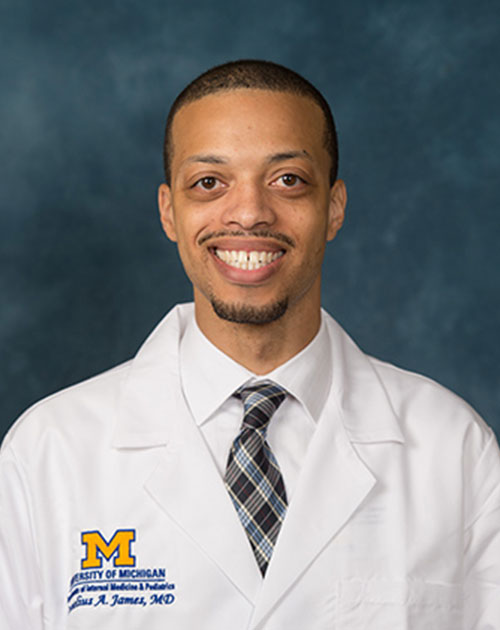 Cornelius James, MD
Cornelius James, MD
University of Michigan Medical School
Dr. James is an assistant professor in the Departments of Internal Medicine and Pediatrics at the University of Michigan. His clinical interests include preventative health, transition of pediatric patients to adult medicine, and primary care of medically complex patients. Dr. James is also the Medical Education Liaison for the Division of General Medicine at the University of Michigan. He serves on local and national committees, including the Academy of Medical Educators Steering Committee at the University of Michigan and the Society of General Internal Medicine Education Committee. He is a member of Society of General Internal Medicine and the American College of Physicians.
Much of Dr. James’s work centers around medical education. He has successfully led revamps of evidence-based medicine curricula at the UME and GME levels at the University of Michigan. Dr. James’s long-term goals include developing innovative methods to teach learners across the medical education continuum; to provide high value, evidence-based, data-driven, patient-centered care using a systems thinking approach; and to educate medical professionals about the use of artificial intelligence and machine learning to inform medical decision-making.
Dr. James received a B.S. from Central Michigan University and an M.D. from Wayne State University. He completed a combined internal medicine and pediatrics residency at the Beaumont Health. Dr. James is board certified in pediatrics and internal medicine.
Proposal: Data Augmented, Technology Assisted Medical Decision Making and Diagnosis (DATA-MD): A Novel Curriculum
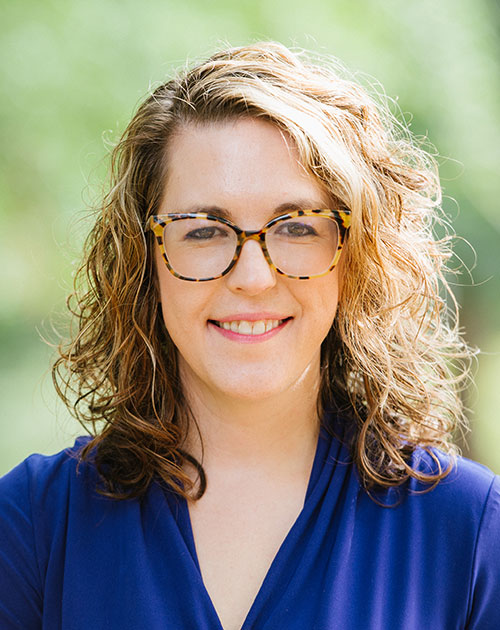 Jessica Keim-Malpass, PhD, RN
Jessica Keim-Malpass, PhD, RN
University of Virginia
Dr. Keim-Malpass is a nurse scientist who serves as an associate professor of nursing and an associate professor of pediatrics at the University of Virginia. She is also a founding member of the Center for Advanced Medical Analytics at the University of Virginia, focusing on care-team driven aspects of application of advanced medical analytics in real world settings, specifically in elucidating the diagnostic process and early clinical action.
Dr. Keim-Malpass’s research background is in clinical research, health economics, regulatory science, and development and the implementation of advanced modeling approaches. She is particularly interested in contributing to high-quality value-based care that can impact health care affordability. Her long-term goals include developing measures and economic frameworks to appropriately evaluate the impact of early action and improvements in the diagnostic process.
Dr. Keim-Malpass received her B.S. from the Wake Forest University and an M.S. in health evaluation sciences, an M.S.N., and a Ph.D. in nursing science from the University of Virginia. She also received an M.S. in regulatory science from the Johns Hopkins University. Dr. Keim-Malpass completed a postdoctoral fellowship at the Wake Forest University. She is a registered nurse.
Proposal: Developing an Economic Framework for Critically Ill Children to Achieve Diagnostic Excellence in Sepsis: Achieving Balance between Early Diagnostic Action and Medical Overuse
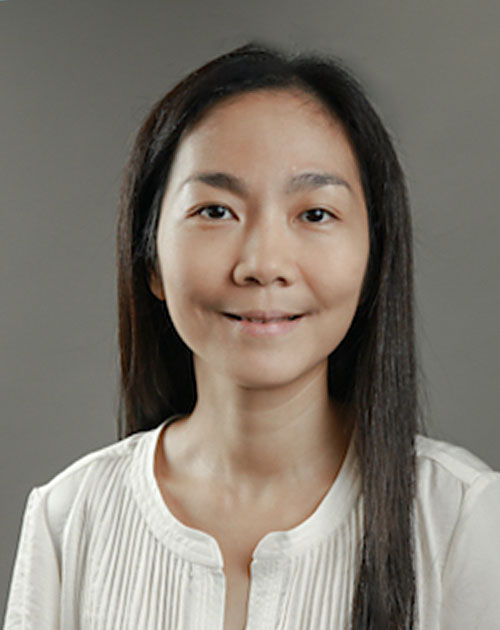
Mei-Sing Ong, PhD
Harvard Medical School/Harvard Pilgrim Health Care Institute
Dr. Ong is an assistant professor in the Department of Population Medicine at Harvard Medical School and Pilgrim Health Care Institute. She is also an affiliated faculty member for the Computational Health Informatics Program at Boston Children’s Hospital.
Dr. Ong has a multidisciplinary background in computer science, biomedical informatics, epidemiology, diagnostic safety, and pediatric health research. As a scientist working at the intersection of informatics and medicine, her research focuses broadly on harnessing longitudinal clinical data to study healthcare systems, disease epidemiology, and health outcomes. Dr. Ong’s research efforts have focused on improving diagnostic excellence, and her research applies advanced clinical analytics to electronic clinical data to elucidate the patterns of underdiagnosed diseases and to understand the underlying drivers of diagnostic failures.
Dr. Ong received a B.S. in computer engineering, an M.S. in biomedical engineering, and a Ph.D. in health informatics from the University of New South Wales in Sidney, Australia. She subsequently completed her postdoctoral fellowships at Harvard Medical School and Boston Children’s Hospital.
Proposal: A Data-driven Approach Towards Understanding the Patterns of Diagnostic Delay
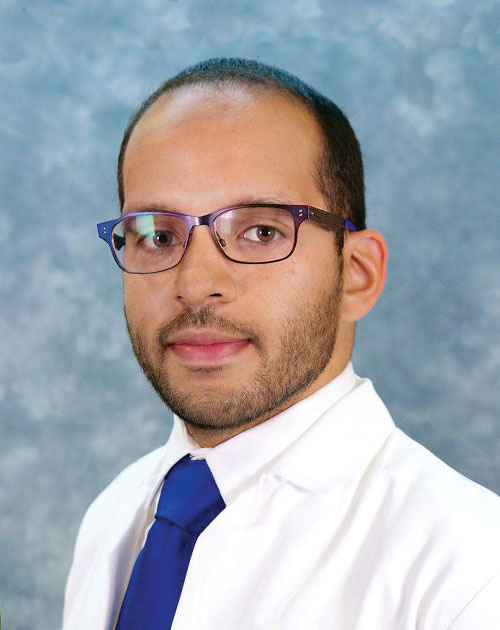 Jorge Rodriguez, MD
Jorge Rodriguez, MD
Harvard Medical School/Brigham and Women’s Hospital
Dr. Rodriguez is a hospitalist and researcher at the Brigham and Women's Hospital in the Division of General Internal Medicine and Primary Care. He also is a faculty member at Harvard Medical University.
Dr. Rodriguez is interested in patient-oriented research focused on the application of health IT to address disparities. In particular, he is interested in ensuring equitable and safe care using patient-facing health technology, including patient portals, mobile apps, and telehealth, especially among limited English proficient patients.
Dr. Rodriguez received a B.S. from Brown University and an M.D. from Tufts University School of Medicine. He completed his residency at the Massachusetts General Hospital as well as a clinical informatics fellowship at the Beth Israel Deaconess Medical Center. He is board certified in internal medicine.
Proposal: Towards Diagnostic Equity: Evaluating Diagnostic Error in Telemedicine Among Limited English Proficient Patients Presenting with Abdominal Pain
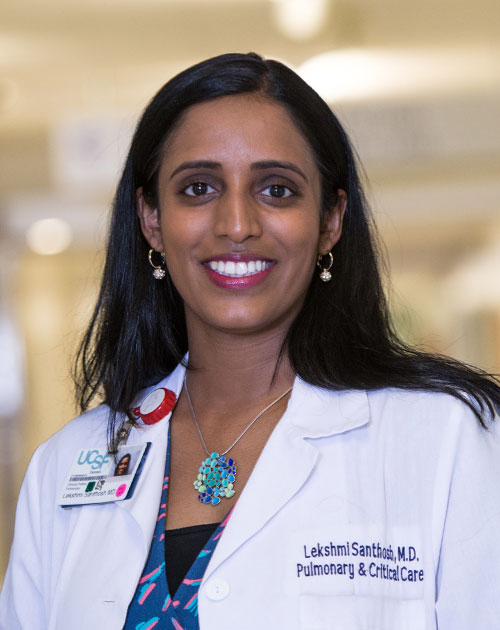
Lekshmi Santhosh, MD, MAEd
University of California, San Francisco
Dr. Santhosh is an assistant professor of pulmonary/critical care medicine and hospital medicine at the University of California, San Francisco (UCSF). She serves as the Associate Program Director of the UCSF Pulmonary and Critical Care Fellowship Program and the Assistant Site Director for the Internal Medicine Residency at Parnassus. She also is the Director of the Department of Medicine Grand Rounds as well as the founder and the medical director of the multidisciplinary long-COVID/post-ICU OPTIMAL Clinic at UCSF.
Dr. Santhosh’s scholarly interests lie at the intersection of medical education, quality improvement, and program development and implementation. Her primary interests in medical education research are related to ICU transitions of care, women in leadership, clinical reasoning, and subspecialty career choice.
Dr. Santhosh received a B.A. from Yale University and an M.D. from Harvard Medical School. She completed her internal medicine residency and pulmonary/critical care medicine fellowship at UCSF. She also received an M.A.Ed. in Health Professions Education from the University of California, Berkeley. Dr. Santhosh is board certified in internal medicine, pulmonary, and critical care medicine.
Proposal: PAUSE for Uncertainty: Development & Implementation of a Novel Framework for Diagnostic Uncertainty During Transitions of Care